For renters, the economic uncertainty of the pandemic has meant that homeownership plans have been put on hold. According to a recent study from Yardi’s RENTCafé, due to unforeseeable nature of current events, 43% of renters report that they plan to delay homeownership for five years or longer. The survey, which ran at the end of May 2020, asked 7,000 renters about their housing plans before and after the coronavirus hit. Financial worry is cited as the main reason why 21% of the renters surveyed plan to postpone buying a home for at least five years, while nearly one-quarter of renters said they would never be able to purchase a home.
As renters look forward, they are choosing the housing options that gives them the most financial stability until they have the confidence to undertake bigger financial transactions. Homeownership comes with additional—and often unpredictable expenses—including interest, property taxes, insurance and maintenance. Apartment living, with its consistent monthly rent and one-time deposit, is more appealing to renters than home buying right now. And, in more than half (59%) of housing markets nationwide — 442 of 755 U.S. counties — renting a three-bedroom property is now more affordable than buying a median-priced home.
“We’re seeing higher renewal rates across our portfolio as tenants remained in their apartments during the lockdown,” said Chris Finlay, founder and chairman of Lloyd Jones, LLC. “Those properties that were well-positioned before the pandemic will continue to perform well, with above-average income growth and property price appreciation.”
Across demographics, while younger generations like millennials are more likely to want to own a home—even if it’s five years or more down the road—half of baby boomers said they wouldn’t purchase a home again. The less costly, more convenient apartment lifestyle may play a role. With renter households over 60 increasing considerably in the past decade, boomers seem to be getting more and more comfortable with renting.
“Tenants who move to buy a home is one of the main reason for vacancies,” said Finlay. “Considering the current market conditions, renting appears to remain the lifestyle of choice for many, including a growing market of seniors. There continues to be a tremendous demand for affordable, highly amenitized rental communities for seniors to age in place, and we believe is this an excellent investment opportunity that offers lower risks and excellent returns.”




